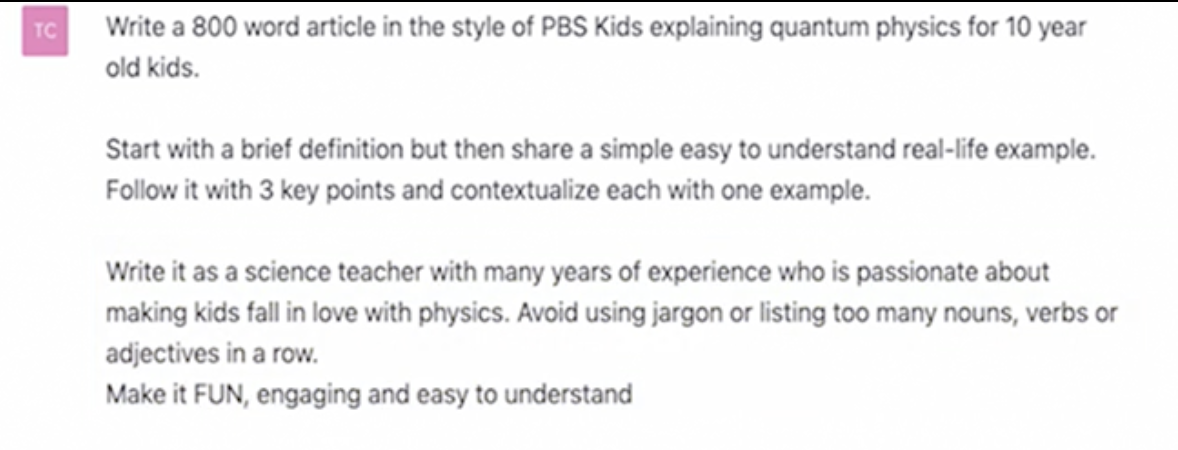Course Notes
Source on LinkedIn Learning - LinkedIn made this course available for free for 24h My completion
Was co-created using ChatGPT

Exercise: Pause and reflect
- Take a view moments to think of one thing your business could use help with today
- How could AI assist with that need
Course: Becoming and AI first leader
Major Factors in Al Advancement
- Innovative deep learning architectures
- Expansion of computing power
-
Trained on the entire internet
- Create new products
- Reimagine user experiences
- Reinvent workflows
I you do have reservations .. write them down.
Define Algorithm objective - what is your goal and what do you want to accomplish?
Recent AI lower the entry bar for companies with less data (helping with the cold start problem).
Data alone will not be sufficient.
GPT (Generative Pretrained Transformer) General purpose Al models with a broad objective function, already trained on all public knowledge
Fine tuning and train the models on the unique dataset that we have.
- to make our product unique
The AI model
- a foundational model is considered a new paradigm for building an AI system
- Rule based algorithms
- Search & optimization algorithms
- machine learning - supervises, unsupervises and reinforcement learning
- deep learning
- transformers and GPT (LLM)
- based on transformers - Deep Learning architecture
- diffusion model
Transformers
A type of neural network that uses a technique called “self-attention” to identify which parts of an input are most essential
Diffusion models
Gradually transform a random noise starting image into a target image, through a series of small, randomly determined steps
Reinforcement Learning from Human Feedback
This approach uses signals from human evaluators (such as upvotes or downvotes) to improve the performance of an Al model.
Prompt engineering
- need to be specific, nuanced and very well articulated

- provide right context and guidance
- needs trials and iterations
Zero-shot, one-shot, and few-shot learning refer to situations where Al is able to perform new tasks with very limited learning, even zero learning-basically no data.
Workflow automation
- a good place to start with AI
- creating, integrating, analyzing, summarizing reports - and facilitate that end-2-end experience
Use AI for Data and Analytics
- Integrating data and reports
- Creating new data sets
- Generating synthetic data
- Summarizing large data sets
Speed up innovation
Create adaptive content based on AI tutors.
Getting started
- Define objective
- Evaluate current capabilities
- Identify data needed
- Select the AI systems
- Monitor, refine and assess results
Identify the right AI systems
- Course Notes AI landscape map
- What formats of data do I need?
- How often does it need to be refreshed?
- What source of high quality data do I have at scale?
Implementation How easy or difficult will it be to implement this type of Al in your company?
Scalability Can the model scale with your business?
Transparency Are you able to understand how the model making its decisions?
Vendors
- Provide you with an established Al system
- Help with data management and integration
- Offer technical support and expertise
You can’t manage what you don’t understand
Ask yourself, given my objectives and current state, and by thinking Al-first, what can I do to create business value in a differentiated way?
Action Create a lightweight sandbox capability to help teams experiment in a safe environment
Limitations of AI today
as of 2023-7-23
An oversimplified view of your objective
The most important thing for any project, especially an Al project, is setting a clear objective and plan
High computational costs
Generating new content often requires significant computing space, power, and time
Algorithm hallucination
Al doesn’t know how to say “I don’t know”
- ensure to have guardrailes in place
Staleness
Generative Al models can be limited by the data they have been trained on
Restrictiveness
Generative Al models don’t do well when it comes to access to basic information
Interpretability
Many generative Al models tend to be black box systems, meaning it can be difficult to understand why they generate a given output
Token constraints
A token refers to a unit that the generative Al system is able to process at one time
Ability to keep state
Keeping state or memory is essentially the ability to remember past inputs and build off them in order to generate outputs
Data quality and availability
We discussed the importance of “feeding” your Al with high-scale, high-quality data
Ethical concerns
Generative Al can be used to create fake content or for malicious purposes
Ethics & Data privacy
Linked with [[Ethics in AI]]
- transparency
- types of data used
- explaining decisions made
- data bias
- data privacy
- collect, stores, use
- know what sensitive data you have
- establish clear policies
- educate your employees
- Intellectual Property (IP) violations
- understand the laws around that
Key Steps
- Establish reporting and feedback mechanisms
- Review prompts and output
- Educate users of Al content about their responsibilities
Future
- Advancements in algorithms
- Reduced demand for computing power
- Allowance of more tokens
- Computational resources
Linking
- AI mindset course
- MOC Artificial Intelligence
- Becoming an AI first product leader course